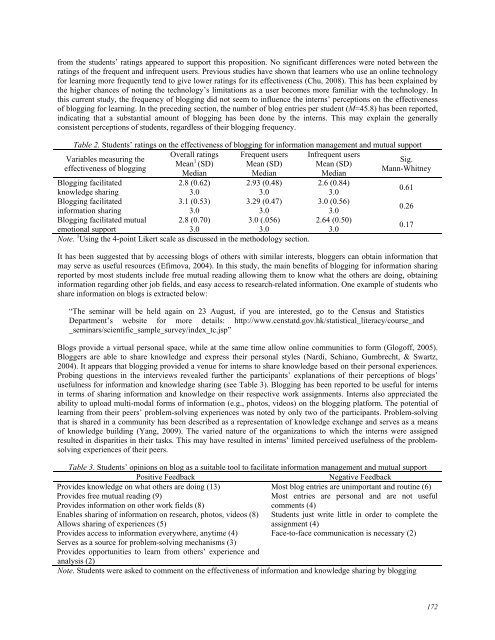April 2012 Volume 15 Number 2 - Educational Technology & Society
April 2012 Volume 15 Number 2 - Educational Technology & Society
April 2012 Volume 15 Number 2 - Educational Technology & Society
You also want an ePaper? Increase the reach of your titles
YUMPU automatically turns print PDFs into web optimized ePapers that Google loves.
from the students’ ratings appeared to support this proposition. No significant differences were noted between the<br />
ratings of the frequent and infrequent users. Previous studies have shown that learners who use an online technology<br />
for learning more frequently tend to give lower ratings for its effectiveness (Chu, 2008). This has been explained by<br />
the higher chances of noting the technology’s limitations as a user becomes more familiar with the technology. In<br />
this current study, the frequency of blogging did not seem to influence the interns’ perceptions on the effectiveness<br />
of blogging for learning. In the preceding section, the number of blog entries per student (M=45.8) has been reported,<br />
indicating that a substantial amount of blogging has been done by the interns. This may explain the generally<br />
consistent perceptions of students, regardless of their blogging frequency.<br />
Table 2. Students’ ratings on the effectiveness of blogging for information management and mutual support<br />
Variables measuring the<br />
effectiveness of blogging<br />
Overall ratings<br />
Mean 1 (SD)<br />
Median<br />
2.8 (0.62)<br />
3.0<br />
3.1 (0.53)<br />
3.0<br />
2.8 (0.70)<br />
3.0<br />
Frequent users<br />
Mean (SD)<br />
Median<br />
2.93 (0.48)<br />
3.0<br />
3.29 (0.47)<br />
3.0<br />
3.0 (.056)<br />
3.0<br />
Blogging facilitated<br />
knowledge sharing<br />
Blogging facilitated<br />
information sharing<br />
Blogging facilitated mutual<br />
emotional support<br />
Note. 1 Using the 4-point Likert scale as discussed in the methodology section.<br />
Infrequent users<br />
Mean (SD)<br />
Median<br />
2.6 (0.84)<br />
3.0<br />
3.0 (0.56)<br />
3.0<br />
2.64 (0.50)<br />
3.0<br />
Sig.<br />
Mann-Whitney<br />
It has been suggested that by accessing blogs of others with similar interests, bloggers can obtain information that<br />
may serve as useful resources (Efimova, 2004). In this study, the main benefits of blogging for information sharing<br />
reported by most students include free mutual reading allowing them to know what the others are doing, obtaining<br />
information regarding other job fields, and easy access to research-related information. One example of students who<br />
share information on blogs is extracted below:<br />
“The seminar will be held again on 23 August, if you are interested, go to the Census and Statistics<br />
Department’s website for more details: http://www.censtatd.gov.hk/statistical_literacy/course_and<br />
_seminars/scientific_sample_survey/index_tc.jsp”<br />
Blogs provide a virtual personal space, while at the same time allow online communities to form (Glogoff, 2005).<br />
Bloggers are able to share knowledge and express their personal styles (Nardi, Schiano, Gumbrecht, & Swartz,<br />
2004). It appears that blogging provided a venue for interns to share knowledge based on their personal experiences.<br />
Probing questions in the interviews revealed further the participants’ explanations of their perceptions of blogs’<br />
usefulness for information and knowledge sharing (see Table 3). Blogging has been reported to be useful for interns<br />
in terms of sharing information and knowledge on their respective work assignments. Interns also appreciated the<br />
ability to upload multi-modal forms of information (e.g., photos, videos) on the blogging platform. The potential of<br />
learning from their peers’ problem-solving experiences was noted by only two of the participants. Problem-solving<br />
that is shared in a community has been described as a representation of knowledge exchange and serves as a means<br />
of knowledge building (Yang, 2009). The varied nature of the organizations to which the interns were assigned<br />
resulted in disparities in their tasks. This may have resulted in interns’ limited perceived usefulness of the problemsolving<br />
experiences of their peers.<br />
Table 3. Students’ opinions on blog as a suitable tool to facilitate information management and mutual support<br />
Positive Feedback Negative Feedback<br />
Provides knowledge on what others are doing (13)<br />
Most blog entries are unimportant and routine (6)<br />
Provides free mutual reading (9)<br />
Most entries are personal and are not useful<br />
Provides information on other work fields (8)<br />
comments (4)<br />
Enables sharing of information on research, photos, videos (8) Students just write little in order to complete the<br />
Allows sharing of experiences (5)<br />
assignment (4)<br />
Provides access to information everywhere, anytime (4) Face-to-face communication is necessary (2)<br />
Serves as a source for problem-solving mechanisms (3)<br />
Provides opportunities to learn from others’ experience and<br />
analysis (2)<br />
Note. Students were asked to comment on the effectiveness of information and knowledge sharing by blogging<br />
0.61<br />
0.26<br />
0.17<br />
172

















